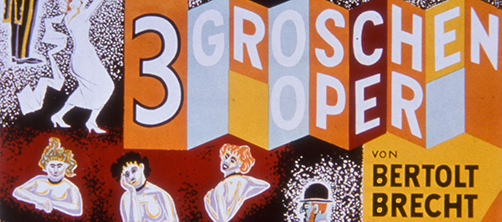
Mendiants, voleurs, putains... plongée haute en couleurs dans les bas-fonds de Soho vers 1900, où brigands et bourgeois s’exploitent, rêvent et s’encanaillent. Peachum, qui fait de la pauvreté son fonds de commerce, s’enrichit sur le dos de faux mendiants s’évertuant à éveiller la compassion des passants.
L'Opéra de quat'sous (titre original en allemand est Die Dreigroschenoper / en anglais: The Threepenny Opera) est un musical allemand de Bertolt Brecht et Kurt Weill, créé le 31 août 1928 au Theater am Schiffbauerdamm de Berlin. Elle est inspirée de la pièce du dramaturge anglais John Gay, The Beggar's Opera (1728).
Prologue
A street singer entertains the crowd with the illustrated murder ballad or Bänkelsang, titled "Die Moritat von Mackie Messer" (Ballad of Mack the Knife). As the song concludes, a well-dressed man leaves the crowd and crosses the stage. This is Macheath, alias "Mack the Knife".
Acte I
The story begins in the shop of Jonathan Jeremiah Peachum, the boss of London's beggars, who outfits and trains the beggars in return for a slice of their takings from begging. In the first scene, the extent of Peachum's iniquity is immediately exposed. Filch, a new beggar, is obliged to bribe his way into the profession and agree to pay over to Peachum 50 percent of whatever he made; the previous day he had been severely beaten up for begging within the area of jurisdiction of Peachum's protection racket. This acts as a depiction of capitalist exploitation, in a world where even beggars, individuals at the most exposed and lowest class, are constrained to pay protection.
After finishing with the new man, Peachum becomes aware that his grown daughter Polly did not return home the previous night. Peachum, who sees his daughter as his own private property, concludes that she has become involved with Macheath. This does not suit Peachum at all, and he becomes determined to thwart this relationship and destroy Macheath.
The scene shifts to an empty stable where Macheath himself is preparing to marry Polly once his gang has stolen and brought all the necessary food and furnishings. No vows are exchanged, but Polly is satisfied, and everyone sits down to a banquet. Since none of the gang members can provide fitting entertainment, Polly gets up and sings "Seeräuberjenny", a revenge fantasy in which she is a scullery maid turning pirate queen to order the execution of her bosses and customers. The gang becomes nervous when the Chief of Police, Tiger Brown, arrives, but it's all part of the act; Brown had served with Mack in England's colonial wars and had intervened on numerous occasions to prevent the arrest of Macheath over the years. The old friends duet in the "Kanonen-Song" (Cannon Song" or "Army Song). In the next scene, Polly returns home and defiantly announces that she has married Macheath by singing the "Barbarasong" (Barbara Song). She stands fast against her parents' anger, but she inadvertently reveals Brown's connections to Macheath which they subsequently use to their advantage.
Acte II
Polly warns Macheath that her father will try to have him arrested. He is finally convinced that Peachum has enough influence to do it and makes arrangements to leave London, explaining the details of his bandit "business" to Polly so she can manage it in his absence. Before he leaves town, he stops at his favorite brothel, where he sees his ex-lover, Jenny. They sing the "Zuhälterballade" (Pimp's Ballad) about their days together, but Macheath doesn't know Mrs Peachum has bribed Jenny to turn him in. Despite Brown's apologies, there's nothing he can do, and Macheath is dragged away to jail. After he sings the "Ballade vom angenehmen Leben" (Ballad of the Pleasant Life), another girlfriend, Lucy (Brown's daughter) and Polly show up at the same time, setting the stage for a nasty argument that builds to the "Eifersuchtsduett" (Jealousy Duet). After Polly leaves, Lucy engineers Macheath's escape. When Mr Peachum finds out, he confronts Brown and threatens him, telling him that he will unleash all of his beggars during Queen Victoria's coronation parade, ruining the ceremony and costing Brown his job.
Acte III
Jenny comes to the Peachums' shop to demand her money for the betrayal of Macheath, which Mrs Peachum refuses to pay. Jenny reveals that Macheath is at Suky Tawdry's house. When Brown arrives, determined to arrest Peachum and the beggars, he is horrified to learn that the beggars are already in position and only Mr Peachum can stop them. To placate Peachum, Brown's only option is to arrest Macheath and have him executed. In the next scene, Macheath is back in jail and desperately trying to raise a sufficient bribe to get out again, even as the gallows are being assembled. Soon it becomes clear that neither Polly nor the gang members can, or are willing to, raise any money, and Macheath prepares to die. He laments his fate and poses the questions: "What's picking a lock compared to buying shares? What's breaking into a bank compared to founding one? What's murdering a man compared to employing one?" Macheath asks everyone for forgiveness (Grave Inscription). Then a sudden and intentionally comical reversal: Peachum announces that in this opera mercy will prevail over justice and that a messenger on horseback will arrive (Walk to Gallows); Brown arrives as that messeneger and announces that Macheath has been pardoned by the queen and granted a title, a castle and a pension. The cast then sings the Finale, which ends with a plea that wrongdoing not be punished too harshly as life is harsh enough.